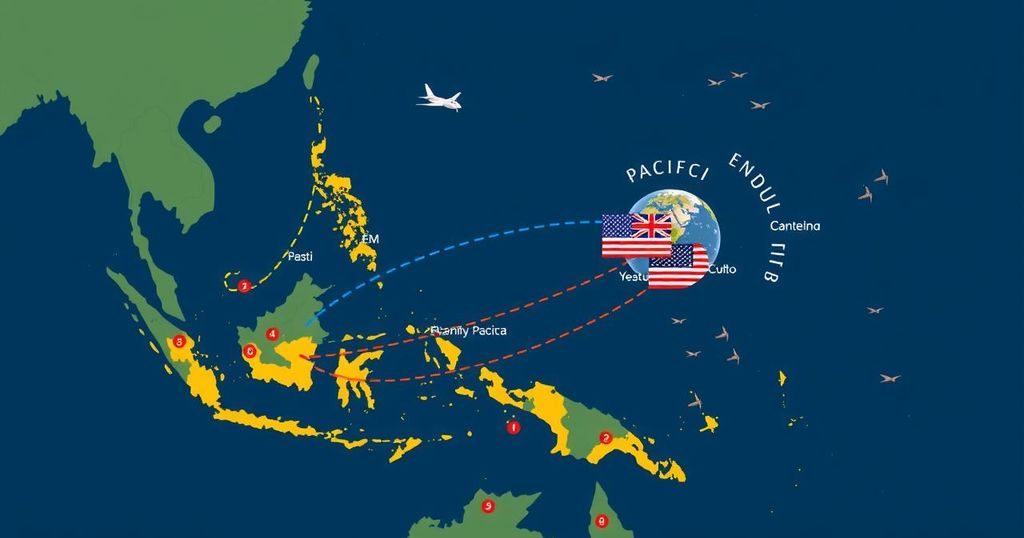Heritage Foundation Advocates for Continued U.S. Engagement in Pacific Islands Against Chinese Influence
The Heritage Foundation’s new report stresses the necessity of U.S. engagement with Pacific Island nations to counter Chinese influence. It suggests that this investment is crucial for U.S. national security, drawing support from some Republican leaders while highlighting the need to address other regional concerns such as climate change.
A recent report from the Heritage Foundation emphasizes the importance of sustained U.S. engagement with Pacific Island nations, irrespective of the administration in power. According to Andrew Harding, a research assistant at the Heritage Foundation’s Asian Studies Center, investing in these islands is crucial to countering Chinese influence and maintaining U.S. national security interests in the region. The report highlights the rising competition between Washington and Beijing in the Pacific, which has become an essential strategic front. Support for this initiative is apparent among certain factions within the Republican Party. Alexander Velez-Green, the former national security adviser to Senator Josh Hawley, described the report as presenting a “compelling vision,” underscoring the strategic significance of the Pacific Islands in America’s efforts to balance power against China. Alexander Gray, a former adviser in the Trump administration, concurred, suggesting that the report should be relevant to whoever assumes the presidency in January 2025, hinting at the potential for a second Trump administration to expand upon these strategies. Despite the optimism surrounding the report, some experts argue that it addresses only part of a multifaceted issue. John Hennessey-Niland, former U.S. ambassador to Palau, pointed out that while Chinese interference is a concern, other pressing issues such as climate change and local governance capacity must not be overlooked. Kathryn Paik, a senior fellow at the Center for Strategic and International Studies, echoed these sentiments, stating that an approach focused solely on China may overlook the historic, cultural, and shared values that can strengthen U.S.-Pacific relations beyond the reach of Chinese ambitions. Harding, however, contends that the main impetus for U.S. engagement should be the competition with China, which poses significant threats to American interests. The report notes that Chinese President Xi Jinping has been proactive in engaging with Pacific Island leaders, contrasting with the Biden administration’s limited outreach, which has included joint meetings but no direct visits to the region. Analysts indicate that many of the report’s 31 policy recommendations hold bipartisan appeal, such as appointing a special envoy for the Pacific Islands and enhancing U.S. foreign assistance efforts in the region. Greg Brown from the Australian Strategic Policy Institute stressed the necessity of a special envoy who can advocate effectively for increased engagement and funding, emphasizing the importance of educating Congress on the strategic value of these islands as an integral part of America’s national security strategy.
The ongoing geopolitical competition between the United States and China has intensified in the Pacific Islands, a region that is becoming increasingly significant in global diplomacy and security strategies. The Heritage Foundation, a conservative think tank, has released a report emphasizing the need for strengthened U.S. ties with these nations as a means to counteract Chinese influence. Various policymakers and analysts recognize the potential benefits of deeper engagement in the Pacific but warn against an overly narrow focus on countering China, highlighting the importance of addressing broader regional issues such as climate change and development.
The Heritage Foundation’s report advocates for sustained U.S. engagement with Pacific Island nations as a strategy to counteract Chinese ambitions. While the report has garnered support from some U.S. officials and provides numerous policy recommendations, there are voices cautioning against an exclusive focus on China, stressing the need to address diverse regional challenges. The effectiveness of these strategies hinges on securing Congressional support and effectively communicating the strategic importance of the Pacific Islands to U.S. national interests.
Original Source: www.voanews.com




Post Comment